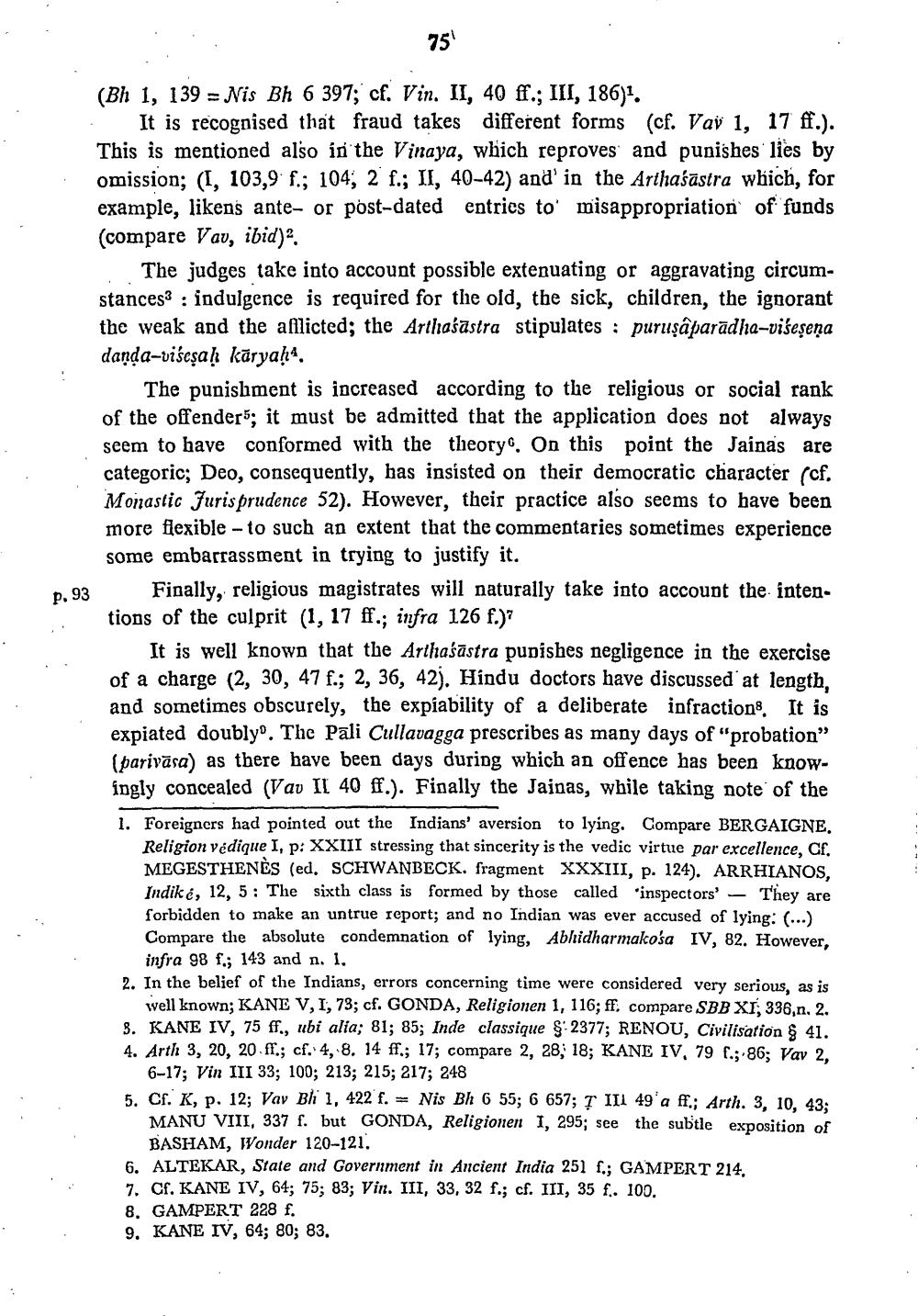________________
75
P. 93
(Bh 1, 139 = Nis Bh 6 397; cf. Vin. II, 40 ff.; III, 1861.
It is recognised that fraud takes different forms (cf. Vav 1, 17 ff.). This is mentioned also in the Vinaya, which reproves and punishes lies by omission; (I, 103,9 f.; 104, 2 f.; II, 40-42) and' in the Arthasāstra which, for example, likens ante- or post-dated entries to misappropriation of funds (compare Vav, ibid).
The judges take into account possible extenuating or aggravating circumstances3 : indulgence is required for the old, the sick, children, the ignorant the weak and the afllicted; the Arthaśāstra stipulates : puruşấparādha-višeşena danda-viścşah kāryah.
The punishment is increased according to the religious or social rank of the offenders, it must be admitted that the application does not always seem to have conformed with the theory. On this point the Jainas are categoric; Deo, consequently, has insisted on their democratic character (cf. Monastic Jurisprudence 52). However, their practice also seems to have been more flexible - to such an extent that the commentaries sometimes experience some embarrassment in trying to justify it.
Finally, religious magistrates will naturally take into account the intentions of the culprit (1, 17 ff.; infra 126 f.)?
It is well known that the Arthaśāstra pupishes negligence in the exercise of a charge (2, 30, 47 f.; 2, 36, 42). Hindu doctors have discussed at length. and sometimes obscurely, the expiability of a deliberate infractions. It is expiated doubly'. The Pali Cullavagga prescribes as many days of "probation" (barivāsa) as there have been days during which an offence has been knowingly concealed (Vav II 40 ff.). Finally the Jainas, while taking note of the 1. Foreigners had pointed out the Indians' aversion to lying. Compare BERGAIGNE.
Religion vedique I, P: XXIII stressing that sincerity is the vedic virtue par excellence, Cf. MEGESTHENÈS (ed. SCHWANBECK. fragment XXXIII, p. 124). ARRHIANOS, Indik é, 12, 5: The sixth class is formed by those called 'inspectors' - They are forbidden to make an untrue report; and no Indian was ever accused of lying: (...) Compare the absolute condemnation of lying, Abhidharmakosa IV, 82. However,
infra 98 f.; 143 and n. 1, 2. In the belief of the Indians, errors concerning time were considered very serious, as is
well known; KANE V, I, 73; cf. GONDA, Religionen 1, 116; ff. compare SBB XI, 336, n. 2. S. KANE IV, 75 ff., ubi alia; 81; 85; Inde classique S. 2377; RENOU, Civilisation & 41. 4. Arth 3, 20, 20.ff.; cf. 4, 8. 14 ff.; 17; compare 2, 28, 18; KANE IV, 79 f.;.86; Vav 2.
6-17; Vin III 33; 100; 213; 215; 217; 248 5. Cf. K, p. 12; Vav Bh 1, 422 f. = Nis Bh 6 55; 6 657; Ţ III 49' a ff.; Arth. 3, 10, 43;
MANU VIII, 337 f. but GONDA, Religionen I, 295; see the subtle exposition of
BASHAM, Wonder 120-121. 6. ALTEKAR, State and Government in Ancient India 251 f.; GAMPERT 214. 7. Cf. KANE IV, 64; 75; 83; Vin. III, 33, 32 f.; cf. III, 35 f.. 100. 8. GAMPERT 228 f. 9. KANE IV, 64; 80; 83.




